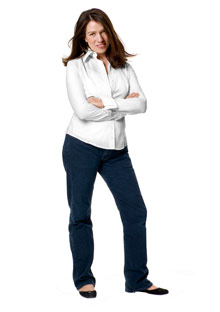Parents Say the Darndest Things

Photo: Mark Andrew
Three O staffers come forward with their own stories, starting with Celia Barbour.
I knew how I was supposed to look, and that I didn't measure up. My sources were, on the one hand, Charlie's Angels and, on the other, the hallway mirror, which testified to the inadequacy of my 13-year-old body."I'm so fat and ugly no one's ever going to like me," I moaned to my mother.
She was not alarmed. She said, almost scoldingly, "You look fine. You are not fat. Sit up straight and finish your breakfast.
Clearly, she was blind. I embarked on a jogging regimen, awakening in the darkness to put on my Adidas, slipping out of the house. When I returned, my father barely looked up from his oatmeal. "If you want exercise, there's plenty of lawn to be mowed," he said.
My parents' obtuseness antagonized me. Instead of helping me overcome my freakishness, they pretended not to see it. To them, exercise was frivolous; dieting was frivolous. The whole pursuit of beauty—makeup, blow-dryers, my beloved Mademoiselle magazine that explained step-by-step how to create a smoldering eye—was a huge, scandalous waste of energy. I longed with the deep hunger of the malnourished to experience prettiness in all its artificially enhanced forms. But I couldn't even walk through the kitchen with blush on my cheeks without drawing their quiet censure.
In those days, my father was a professor at a liberal arts college. His colleagues had shaggy hair and dressed in smocks made by Guatemalan peasants, or bore epaulets of dandruff on the shoulders of their thrift store suits. The only people who dolled up their faces and feathered their hair were the townies, and they were not worth emulating. The prevailing attitude on campus was clear: You worried about your appearance only if you had nothing better to contribute to the world. If you were talented, brilliant, funny, or wise, you were free to ignore superficial things, like beauty.
Eventually I emerged into a kind of quiet prettiness. It suited me fine. I was never drop-dead stunning, but I went out with the boys I had crushes on. It was a happy way to spend my late teens and 20s.
Now I am 44 and once again do not love the mirror. In it I see a body stretched and battered by the birth of three children, a face turning wrinkled and gray. And I think, "Yuck." But I also think, "Well, okay, I'm 44. Prettiness was mine when it should have been mine. Now I have other things to attend to."
Sometimes I still wish I were a little more skilled with the eyeliner, but I don't despair. I've realized that my parents' seeming cluelessness was actually great wisdom; they valued my accomplishments more than my looks. And this freed me up to discover a really important secret: The things that make me feel like a superhero—making love, swimming across a lake, staying up all night to write, giving birth to a baby who holds infinity in his eyes—make me look like tangled, puffy hell. But the mirror can't take away what I know in my heart to be true: At times like these, I'm drop-dead gorgeous.



